Learning piano for the first time can be difficult at any age, but young children typically face more significant challenges than people of any other age group while attempting to tackle this incredible instrument. There’s something awe-inspiring about a child being able to play the piano with skill and confidence. The skills a child develops while learning how to play the piano at a young age often stick with them for a lifetime, and research linking benefits like earlier than average development of cognitive skills and increased academic performance have been linked to learning an instrument at a young age.
But without the proper planning, accountability and guidance, it can be difficult or even downright impossible for kids to learn how to play the piano. To help you parents of piano students out there maintain your sanity, we’ve put together 10 tips to help you support your child in learning piano.
Tip #1: Find a piano teacher who will be fun, fair and inspiring for your child
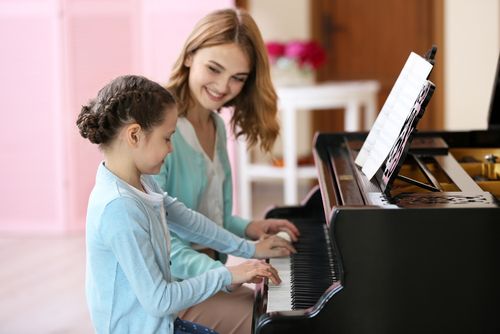 Your child will have virtually no chance of learning piano if the lessons aren’t interesting and engaging. Children succeed in music when they begin to realize that they have the power to shape and construct music by themselves, and a good teacher knows how to empower their students through educational games and exercises in their lessons.
Your child will have virtually no chance of learning piano if the lessons aren’t interesting and engaging. Children succeed in music when they begin to realize that they have the power to shape and construct music by themselves, and a good teacher knows how to empower their students through educational games and exercises in their lessons.
When looking for a piano teacher for your child, qualities like experience and educational training are as important as attitude and enthusiasm. Piano teachers have a big job on their hands. They’re tasked with teaching and inspiring young students while keeping them accountable and on task at the same time. Not every musician can be an effective teacher, so look for someone that specifically teaches children rather than a buddy of yours who happens to play keys in a cover band.
The relationship you and your child forms with a teacher is one that could last years or potentially decades, so choosing the right person to work with your child is hugely important. It’s a good idea to know what you’d like to get out of piano lessons with your child before you set up trial lessons with teachers. If you’re looking for a broad introduction to music through the piano, there’s plenty of teachers out there for that, but if you want a more rigorous piano-based lesson experience for your child, you’ll need to find a teacher with proven concert piano experience.
Tip #2: Have realistic expectations of what your child is able to do in music
Adding your own baggage and unreasonable expectations to your child’s experience in learning piano could potentially transform a powerfully good thing into something negative, hurtful or even destructive. No matter how talented and hardworking your child is, they’re bound to do make mistakes and lose focus during lessons.
Being a kid is hard. Really hard. As developed adults, we often forget what it’s like to be a child because it’s been such a long time since we were young. As a parent, you’ll need to learn how to approach your child’s musical development on the piano with empathy rather than judgement and frustration. This, of course, is a hefty order, but it’s important that your child feels supported and encouraged in learning piano.
Everything from trying to focus on basic tasks to mastery of simple motor functions can be hugely challenging for young piano students, and the added pressure from a parent trying to force their child to succeed is often detrimental to a young student’s development in music. Try to take an honest accounting of the goals and expectations you have set for your child’s musical development and see if there’s any unneeded pressure or self-serving elements in your motivation for getting your child involved with music. Kids thrive when they’re given the freedom and space to do so, so take some time to make sure the atmosphere surrounding their piano experience is a purely positive one.
Tip #3: Young children are rarely able to practice piano on their own
Busy adult readers might not be a fan of this tip, but it’s an important one. Children younger than 10 years old typically are not able to practice piano alone. This means that if you want your child to get the most out of learning piano, you’ll have to closely supervise their practices.
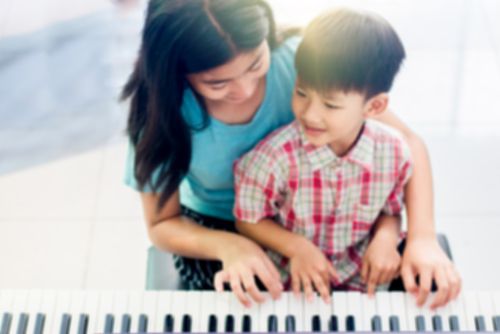 Young students who practice without close supervision typically stay on task for just a few minutes alone before getting distracted and moving on to doing things on the piano that aren’t related to the material covered in lessons. Sitting down with your child to make sure they’re playing through everything they need to is a significant time commitment–– children in piano lessons should practice at least three times a week for thirty minutes–– but this is what’s needed to help young children get all the benefits from learning piano.
Young students who practice without close supervision typically stay on task for just a few minutes alone before getting distracted and moving on to doing things on the piano that aren’t related to the material covered in lessons. Sitting down with your child to make sure they’re playing through everything they need to is a significant time commitment–– children in piano lessons should practice at least three times a week for thirty minutes–– but this is what’s needed to help young children get all the benefits from learning piano.
Kids usually thrive in routines, so if you can, carve out times during your week and devote them to practicing piano with your child. And for your child to be able to receive the full benefit of you supervising their practices, you’ll need to be familiar with what they’re learning in lessons. Communicate with your child’s piano teacher and make sure you fully comprehend what’s being covered in lessons.
Tip #4: Give your child the time and space to explore their musical creativity
Scales, exercises and sheet music are hugely important in your child’s musical development, but young students also need to be able to explore music on their terms to receive the full benefits of learning piano. Giving your child time and space to do whatever they want on piano (so long as they’re not lighting the thing on fire) helps develop skills and ideas that aren’t touched on with the material typically introduced in lessons.
When a young child first sees the piano, they typically want to use it to make as much noise as possible, and this can obviously be difficult for anyone within earshot. When parents and caretakers see this happen, they usually pull the child away from the piano. But if you don’t let your child explore the piano on their terms, they’ll never get a chance to play the piano in a creative way.
Rather than letting your child bang on the piano, try sitting down with them and supervising their creativity. Introducing games where you encourage your child to play only white or black keys is a good way to make sure your young student isn’t just mindlessly banging on the piano. And adding in rules like “only play one key at a time” will help bring some order and boundaries to a child’s creative time with the piano.
Many adult pianists have a difficult time creating and improvising music because they simply weren’t encouraged to be creative musically when they were younger. Giving your child time and space to be creative while they’re young will help ensure that they have access to the creative aspects of their musicianship when they’re older.
Tip #5: Hold monthly household recitals to track progress and provide encouragement
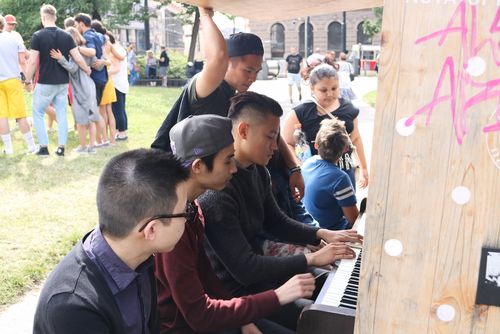
Having your child play everything they’re working on at a monthly recital held in your home is a good way to add more weight and urgency to their experience learning piano. Piano teachers typically hold their own recitals a few times a year, but scheduling your own mini-recitals is a fun way to keep your young piano student encouraged and accountable in the interum.
Try to make these recitals as fun as possible so your child looks forward to them. Have your family and friends fill in as the audience, and provide snacks and a little gift to be given at the end of the recital. Whether your child is tackling a Bach piece or their first major scale, monthly recitals can be hugely beneficial for your young piano student.
This is because skills like learning piano are difficult to develop without a goal for a child to work for. If your child knows they’re expected to perform a small concert every month, they’ll treat their piano practice with more urgency and meaning. And working towards goals like performing at recitals or shows mirrors what it’s actually like to be a working pianist, so these small recitals can be important for helping young piano students know what to expect in the real world.
Tip #6: Provide incentives for staying on task
Creating your own system of incentives is a good way to motivate your young piano student to focus and thrive. For younger children especially, incentives are a great way of showing encouragement and communicating goals and expectations to your child.
Some parents have found success in using a system of piano bucks, which are certificates children can earn by staying focused in lessons, mastering musical concepts or having a great attitude in music. Piano bucks can be exchanged for movie tickets, toys, candy or anything that might motivate your child. Use your creativity freely here.
For older kids, using real money as an incentive for doing well with piano is a good idea. But no matter how old your piano student is, finding actionable ways to reward progress and hard work will help motivate your child in learning piano.
Depending on the age, background and unique progress of your child, you might find yourself in a position of having to reward the small victories of your young piano student. Remember, things that often seem insignificant to us as adults can be monumentally important in the life of a child, so do your best to recognize, celebrate and reward all the good in your child’s piano practice.
Tip #7: Expose your child to as much different music as possible
Many parents often get their children involved in music lessons without a clear plan of showing their kids what their hard work and persistence can turn into. By exposing your kids as much music as possible, you can show them that their work in learning piano can turn into something incredibly meaningful.
If you were asked to devote a huge amount of your time to something but weren’t told what your work was for, you probably wouldn’t put a lot of thought and effort into what you were doing. By showing your young piano student as much music as possible, whether it has piano in it or not, you’re communicating to them that with enough hard work and talent they could be able to write or perform music similar music one day.
It’s important here to show your child different genres of music. The piano is an incredible instrument because of its versatility and dynamic potential, and everyone from Coldplay to Chopin have used the instrument to create their own unique brand of music. Show your child the classical side of the instrument, but don’t stop there. Expose them to blues, jazz, rock and experimental music.
If you can, take your young piano student to as many live concerts featuring the piano as possible. Playing a CD is a start, but nothing can substitute the experience of seeing a talented pianist performing in a live setting. If we want our children to be inspired in music, it’s our job as adults to lay the groundwork for that to happen, so showing your child different types of music while they’re learning piano is a great way to do it.
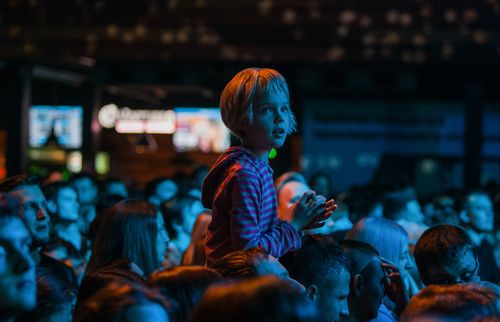
Tip #8: Learn to know when to give your child a break
Like we mentioned before, learning piano can be a hugely challenging experience for people of any age and background. If your child wants to learn how to play the piano, then they’re in for months, years or even decades of difficult, tedious work that can often feel thankless. If you want your young piano student to succeed, you’ll need to know when it’s time to give them a break.
Many children of ambitious parents set out for piano greatness, work extremely hard for a few years and then suddenly quit when they can’t handle the pressure anymore. Being able to recognize that your child is under pressure and in need of a break is mandatory for parents interested in raising happy and balanced musicians.
Whether it’s skipping a practice to go play outside or taking the summer off, breaks are essential for you as well as your kids. Your child won’t be able to thrive in music unless they’re fully engaged and on board, and giving them plenty of time to be able to breathe will help them to solidify and build on the musical concepts they’re working on. Rather than always encouraging them to push through, try giving your child a break from the piano every once in awhile. Chances are they’ll come back to it with a renewed focus.
Tip #9: Explore the piano’s important role in music with your child
When your child sits down to play the piano, they’re performing on what is probably the most important instrument in all of music. Why? The piano’s keyboard doubles as a perfect linear representation of the ideas that govern music theory. Most of the basic concepts your child masters on the piano can be applied to any other instrument in music.
You don’t need to be familiar with music theory, but your child’s piano teacher should be. An effective music teacher will be able to introduce basic concepts on the piano like scales and chords and be able to relate them to music theory. If you’re unsure if your child’s teacher is doing this, then simply ask if they’re making music theory a part of their lessons.
When most composers sit down to write a piece of music, they do so using a piano. If you convey this fact idea to your child, they might learn to view their work on the piano with a new sense of meaning and importance. The piano has been an instrument for personal empowerment for hundreds of years, and it can be for your child too if present it in the right way.
Tip #10: Learning piano isn’t for everyone
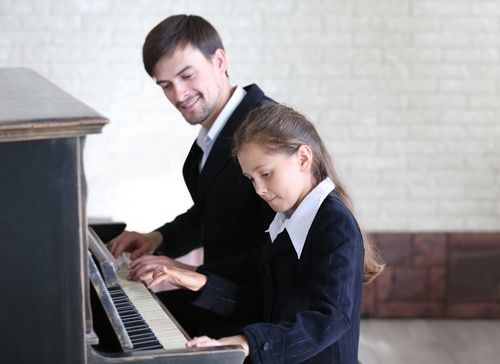 Despite your best efforts and ideas, you might find that your child doesn’t do well in piano lessons. Music isn’t for everyone, and if you find yourself in this situation you shouldn’t view it as a failure. Childhood is about discovering who you are as a person, and it’s a parent’s job to give their children as many opportunities to do that as possible. Music is hugely beneficial for children, but it’s just one of the many activities out there that can enhance their lives.
Despite your best efforts and ideas, you might find that your child doesn’t do well in piano lessons. Music isn’t for everyone, and if you find yourself in this situation you shouldn’t view it as a failure. Childhood is about discovering who you are as a person, and it’s a parent’s job to give their children as many opportunities to do that as possible. Music is hugely beneficial for children, but it’s just one of the many activities out there that can enhance their lives.
If your child consistently dreads lessons, refuses to practice and shows no interest in playing the piano, then it might be time to consider moving on. Frustration from time to time is completely normal, but if your child loathes sitting down to practice, then they’re probably better suited doing something different.
But if your young piano student shows interest and simply needs a little push every now and then, be ready to give them as much encouragement and direction they need to succeed in music. Strong musical development happens over a period of months and years, so if your child shows interest, be prepared for a long road ahead.
Learning piano can one of the best experiences in your child’s life, but it takes work, patience and understanding on the part of the child and the adult to make it happen. For more helpful articles about the world of music, take a look at what else we have posted on the Musika Lessons blog.


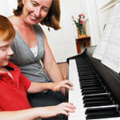





Very informative. It’s like how we teach piano vs how we learn guitar. i.e. piano is a theory first, playing music comes later. Guitar, you learn 3 chords and you can make music right away. I’m pulling my son out of his piano lessons because I need a different approach for him